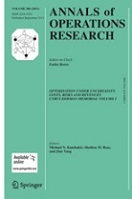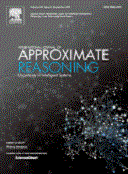 |
||||||
| 02 - 04 November 2023, Kanazawa, Japan [Hybrid Mode Conference] | ||||||
|
|
||||||
| 「With a Special Event Honoring Professor Hung T. NGUYEN and Professor Sadaaki MIYAMOTO for their contributions to the field of Uncertainty Theories」 | ||||||
Hung T. Nguyen (Emeritus Professor, New Mexico State University, USA; Adjunct Professor, Chiang Mai University, THAILAND)
Title: On Uncertainty in Partially Identified Models
This talk is a panorama of uncertainty topics that I have been involved in from Generalized Information Theory to Ambiguity, focusing on current interests in using Random Sets as statistical tools for investigating prediction and decision in the face of ambiguity, espectially in partially identified econometrics models.
Overall the talk spells out how random sets will become the main tools to
investigate uncertainty in the sense of ambiguity in general decision theory,
and in particular in partially identified statistical models in econometrics and finance. The talk evokes the current interests in connections with Optimal Transport Theory in general mathematics.
Bio
Hung T. Nguyen is actually an Emeritus Professor of Mathematical Sciences at New Mexico State University (USA) and an Adjunct Professor of Economics at Chiang Mai University, Thailand. He received his Doctorat d'Etat Es Sciences Mathematiques (Ph.D.) at the University of Lille (France) in 1975. After spending several years at the University of California, Berkeley, and the University of Massachusetts, Amherst, he joined the faculty at New Mexico State University (NMSU), Las Cruces where he retired in 2010, and moved to Thailand where he is currently an Adjunct Professor of Economics at Chiang Mai University. His research covers horizontally a variety of topics under the umbrella of uncertainty analysis, such as Information Theory, Fuzzy sets, Statistics (of di¤usion processes), Probability (Conditional Event Theory, Random sets), Quantum Probability, Belief Functions, and Data Fusion. He is a Fellow of the International Fuzzy Systems Association (IFSA), a Distinguised Lukac Professor of Statistics at Ohio Bowling Green University (2002), a Westhafer Award for Excellence in Research at NMSU, a Distinguised LIFE Chair Professor at Tokyo Institute of Technology (1992-93), and a Distinguished Fellow of the American Society of Engineering Education (ASEE). He has written books on Statistics, Probability, Data Fusion, Random Sets, Conditional Events, and Fuzzy Logics. His current research interests include Quantum Probability and Mathematics of Ambiguity in Econometrics and Finance.
Sadaaki Miyamoto (Emeritus Professor, University of Tsukuba, Japan)
Title: Two Classes of Fuzzy Clustering: Their Theoretical Contributions
Two classes of fuzzy clustering are overviewed with suggestions for future studies.
They are known as fuzzy equivalence relations and fuzzy c-means.
By people in non-fuzzy fields, they are sometimes regarded as
the classical single linkage and a variation of EM algorithm:
the former is correct while the latter is wrong.
A fundamental question is what real and useful contributions of them.
The contribution of fuzzy c-means seems obvious to us in view of
their good performance and robustness, while people in other fields
may not appreciate such properties and
still oppose the use of this method.
We will consider here the contribution of fuzzy c-means regarding
their ability of generalizations and flexibility as well as their
theoretical soundness,
showing different variations of fuzzy c-means with
current problems to be solved.
The other class of fuzzy equivalence corresponds to
the well-known method of the single linkage in agglomerative hierarchical clustering.
There appears to be no real contribution to the traditional theory.
We will show, however, a class of generalizations here related to current non-fuzzy
algorithms with future research possibilities.
These two classes appear to have no relation, but can effectively be used together
in real clustering problems. An example of their relation will be shown.
Bio
Sadaaki Miyamoto was born in Osaka, Japan, in 1950.
He received the B.S.,M.S. and the Dr. Eng. degrees in Applied Mathematics and Physics Engineering from Kyoto University, Japan, in 1973, 1975, and 1978, respectively. He was an Assistant Professor from 1980 to 1987 and Associate Professor from 1987 to 1990 in the University of Tsukuba. He was a Professor with the Faculty of Engineering, the University of Tokushima, where he was working from 1990 to 1994. After working as a Professor at the University of Tsukuba from 1994, he retired on 31st March 2016 and became Professor Emeritus from 1st April 2016.
His research interests include fundamentals in fuzzy systems such as fuzzy multisets
and the theory of fuzzy clustering.
He has published over 300 research papers and four books in English.
He became a Fellow of IFSA (International Fuzzy Systems Association) in 2007.
Hyun Oh Song (Associate Professor, Seoul National University, Korea)
Title: Contrastive Discovery of Hierarchical Achievements in Reinforcement Learning
Discovering hierarchical achievement structures on procedurally generated environments is a challenging task. This requires that agents possess a wide range of skills, including generalization and long-term reasoning. Many previous approaches have relied on model-based or hierarchical methods, assuming that incorporating an explicit module for long-term planning would enhance the learning of hierarchical achievements. However, these approaches suffer from the drawbacks of requiring a high number of interactions with the environment or large model sizes, making them less practical. In this study, we first show that proximal policy optimization (PPO), a simple and general model-free algorithm, outperforms previous methods when incorporating recent implementation techniques. Furthermore, we find that the PPO agent is capable of predicting the next achievement to a certain extent, albeit with low confidence. Building on this observation, we propose a new contrastive learning technique, named achievement distillation, which strengthens the agent's ability to forecast subsequent achievements. Our method exhibits a remarkable performance for discovering hierarchical achievements and achieves state-of-the-art performance on the challenging Crafter environment, with fewer model parameters in a sample-efficient manner.
Bio
Hyun Oh Song is an associate professor in the Department of Computer Science and Engineering at Seoul National University. Previously, he was a full-time research scientist at Google Research, in Mountain View, where he worked on machine learning and deep learning research in Kevin Murphy's team.
Before Google, he was a postdoctoral fellow in SAIL in the Computer Science Department at Stanford University. Hyun Oh received his Ph.D in Computer Science at UC Berkeley in late 2014, where he worked with Trevor Darrell and Stefanie Jegelka. His graduate study was fully supported by Samsung Lee Kun Hee Scholarship Foundation (Now Samsung Scholarship Foundation) for five years.
His research interests are in machine learning, deep learning, and combinatorial optimization. Broadly, he is interested in solving challenging problems in artificial intelligence. He has an academic website at https://mllab.snu.ac.kr/hyunoh/.
Thierry Denoeux (University of Compiègne, France)
Title: Random Fuzzy Sets and Belief Functions: Application to Machine Learning
The theory of belief functions is a powerful formalism for uncertain reasoning, with many successful applications to knowledge representation, information fusion, and machine learning. Until now, however, most applications have been limited to problems (such as classification) in which the variables of interest take values in finite domains. Although belief functions can, in theory, be defined in infinite spaces, we lacked practical representations allowing us to manipulate and combine such belief functions. In this talk, I show that the theory of epistemic random fuzzy sets, an extension of Possibility and Dempster-Shafer theories, provides an appropriate framework for evidential reasoning in general spaces. In particular, I introduce Gaussian random fuzzy numbers and vectors, which generalize both Gaussian random variables and Gaussian possibility distributions. I then describe an application of this new formalism to nonlinear regression.
Bio
Thierry Denoeux is a Full Professor with the Department of Information Processing Engineering at the University of Compiègne, France, and a senior member of the French Academic Institute (Institut Universitaire de France). His research interests concern reasoning and decision-making under uncertainty and, more generally, the management of uncertainty in intelligent systems. His main contributions are in the theory of belief functions with applications to statistical inference, pattern recognition, machine learning and information fusion. He has published more than 300 papers in this area. He is the Editor-in-Chief of the International Journal of Approximate Reasoning, and an Associate Editor of several journals including Fuzzy Sets and Systems and International Journal on Uncertainty, Fuzziness and Knowledge-Based Systems.
















